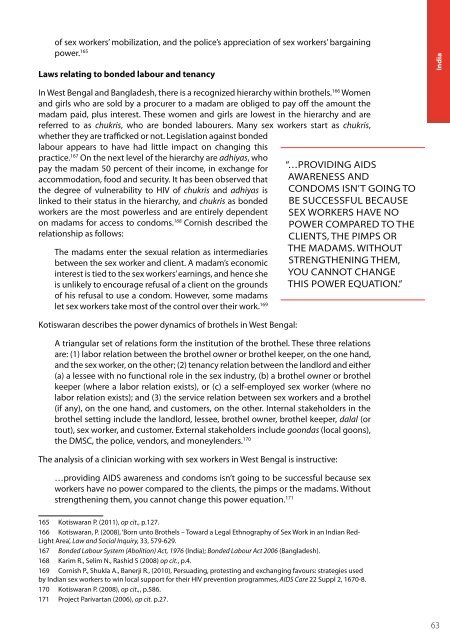SEX WORK AND THE LAW - HIV/AIDS Data Hub
SEX WORK AND THE LAW - HIV/AIDS Data Hub
SEX WORK AND THE LAW - HIV/AIDS Data Hub
Create successful ePaper yourself
Turn your PDF publications into a flip-book with our unique Google optimized e-Paper software.
of sex workers’ mobilization, and the police’s appreciation of sex workers’ bargaining<br />
power. 165<br />
Laws relating to bonded labour and tenancy<br />
India<br />
In West Bengal and Bangladesh, there is a recognized hierarchy within brothels. 166 Women<br />
and girls who are sold by a procurer to a madam are obliged to pay off the amount the<br />
madam paid, plus interest. These women and girls are lowest in the hierarchy and are<br />
referred to as chukris, who are bonded labourers. Many sex workers start as chukris,<br />
whether they are trafficked or not. Legislation against bonded<br />
labour appears to have had little impact on changing this<br />
practice. 167 On the next level of the hierarchy are adhiyas, who<br />
pay the madam 50 percent of their income, in exchange for<br />
accommodation, food and security. It has been observed that<br />
the degree of vulnerability to <strong>HIV</strong> of chukris and adhiyas is<br />
linked to their status in the hierarchy, and chukris as bonded<br />
workers are the most powerless and are entirely dependent<br />
on madams for access to condoms. 168 Cornish described the<br />
relationship as follows:<br />
The madams enter the sexual relation as intermediaries<br />
between the sex worker and client. A madam’s economic<br />
interest is tied to the sex workers’ earnings, and hence she<br />
is unlikely to encourage refusal of a client on the grounds<br />
of his refusal to use a condom. However, some madams<br />
let sex workers take most of the control over their work. 169<br />
Kotiswaran describes the power dynamics of brothels in West Bengal:<br />
A triangular set of relations form the institution of the brothel. These three relations<br />
are: (1) labor relation between the brothel owner or brothel keeper, on the one hand,<br />
and the sex worker, on the other; (2) tenancy relation between the landlord and either<br />
(a) a lessee with no functional role in the sex industry, (b) a brothel owner or brothel<br />
keeper (where a labor relation exists), or (c) a self-employed sex worker (where no<br />
labor relation exists); and (3) the service relation between sex workers and a brothel<br />
(if any), on the one hand, and customers, on the other. Internal stakeholders in the<br />
brothel setting include the landlord, lessee, brothel owner, brothel keeper, dalal (or<br />
tout), sex worker, and customer. External stakeholders include goondas (local goons),<br />
the DMSC, the police, vendors, and moneylenders. 170<br />
The analysis of a clinician working with sex workers in West Bengal is instructive:<br />
“…PROVIDING <strong>AIDS</strong><br />
AWARENESS <strong>AND</strong><br />
CONDOMS ISN’T GOING TO<br />
BE SUCCESSFUL BECAUSE<br />
<strong>SEX</strong> <strong>WORK</strong>ERS HAVE NO<br />
POWER COMPARED TO <strong>THE</strong><br />
CLIENTS, <strong>THE</strong> PIMPS OR<br />
<strong>THE</strong> MADAMS. WITHOUT<br />
STRENG<strong>THE</strong>NING <strong>THE</strong>M,<br />
YOU CANNOT CHANGE<br />
THIS POWER EQUATION.”<br />
…providing <strong>AIDS</strong> awareness and condoms isn’t going to be successful because sex<br />
workers have no power compared to the clients, the pimps or the madams. Without<br />
strengthening them, you cannot change this power equation. 171<br />
165 Kotiswaran P. (2011), op cit., p.127.<br />
166 Kotiswaran, P. (2008), ‘Born unto Brothels – Toward a Legal Ethnography of Sex Work in an Indian Red-<br />
Light Area’, Law and Social Inquiry, 33, 579-629.<br />
167 Bonded Labour System (Abolition) Act, 1976 (India); Bonded Labour Act 2006 (Bangladesh).<br />
168 Karim R., Selim N., Rashid S (2008) op cit., p.4.<br />
169 Cornish P., Shukla A., Banerji R., (2010), Persuading, protesting and exchanging favours: strategies used<br />
by Indian sex workers to win local support for their <strong>HIV</strong> prevention programmes, <strong>AIDS</strong> Care 22 Suppl 2, 1670-8.<br />
170 Kotiswaran P. (2008), op cit.,, p.586.<br />
171 Project Parivartan (2006), op cit. p.27.<br />
63
















